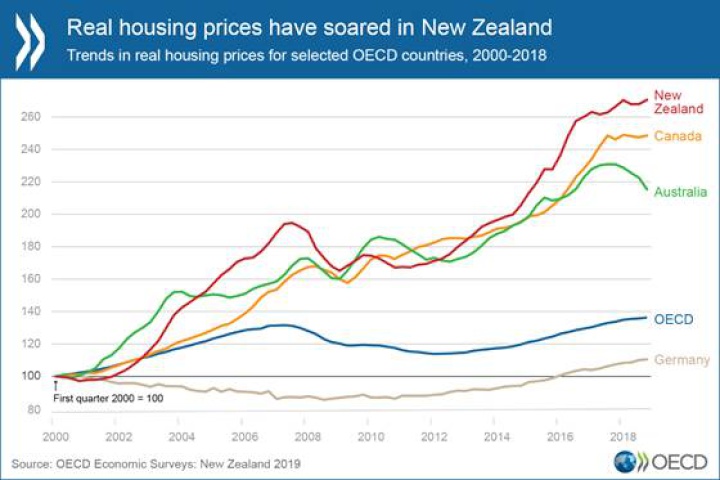NZ can improve well-being through better policymaking - OECD
Paris, 25 June 2019
New Zealand can improve
well-being through better policymaking and reforms to
housing and migration policy, OECD says
New Zealand’s economy has stabilised, with solid growth supporting well-being through jobs and incomes. Ongoing implementation of the government’s new well-being approach to policymaking will offer further opportunities to create a more sustainable and inclusive economy for all New Zealanders, according to a new report from the OECD.
The latest OECD Economic Survey of New Zealand discusses the challenges of maintaining sound growth and improving well-being for all. The Survey projects growth of about 2.5% this year and next, against a backdrop of expansionary monetary policy, healthy public finances and tight labour markets.

The Survey, presented in Wellington by OECD Deputy Secretary-General Ulrik Vestergaard Knudsen and New Zealand Finance Minister Grant Robertson, discusses the need to boost productivity growth, address soaring housing prices and better integrate migrants into the labour market.
“Life is good for most New Zealanders, with high employment, an exceptional natural environment and strong levels of social support and trust,” Mr Vestergaard Knudsen said. “But not everyone enjoys the same levels of well-being, with gaps in health, education, employment, and income. The challenge going forward will be to continue improving well-being through building a more productive, sustainable and inclusive economy.”
New Zealand’s 2019 Budget used well-being evidence to set priorities, choose among different policy options and foster greater collaboration among agencies. Steps should now be taken to integrate well-being into other policy advice and tools, such as regulatory impact assessment and evaluation. Embedding the well-being approach further holds the promise of making policy advice and implementation more effective, through better targeted actions, a deeper understanding of trade-offs and more coordinated cross-government action, the Survey said.
To further develop the well-being evidence base, New Zealand can strengthen measurement of natural capital, innovation, human capital, cultural identity and the integration of indigenous perspectives. It should also ensure sufficient resources are available for collecting key indicators on a regular basis, and with the granularity needed to track inequalities.
Despite generally sound macroeconomic and structural policy settings, productivity and earnings are relatively low in New Zealand. The Survey attributes this to geographical remoteness, insufficient scale, qualification and skills mismatches, weak competitive pressures and low rates of capital investment and R&D activity. Policy settings should be adjusted to further support innovation, business dynamism and competition.
The Survey notes that house prices have risen, affordability has dropped and homelessness is high. Reforms to increase housing supply responsiveness to demand would improve affordability, enhancing well-being. This could include replacement of regulations that restrict new construction with rules that facilitate densification. Also, local government infrastructure funding pressures call for new sources of funding, such as special purpose vehicles financed by targeted rates. Greater priority should be given to new rental housing, including increased provision of social housing in areas with shortages.
Immigration has increased well-being for both immigrants and most of the New Zealand-born, according to the Survey. Migration policy could be improved through more effective targeting to address skills and labour shortages while greater action is needed to ensure that recent immigrants are better integrated into the labour market.
A snapshot of the Economic Survey of New Zealand, with the main conclusions, is accessible at: http://www.oecd.org/economy/new-zealand-economic-snapshot/.
Working with over 100 countries, the OECD is a global policy forum that promotes policies to improve the economic and social well-being of people around the world.
ends


 Gordon Campbell: On Why We Can’t Survive Two More Years Of This
Gordon Campbell: On Why We Can’t Survive Two More Years Of This New Zealand Police: More Than $2.5m Worth Of Assets Restrained In Undeclared Tobacco Case
New Zealand Police: More Than $2.5m Worth Of Assets Restrained In Undeclared Tobacco Case SPCA: Survey Shows Government Lacks Mandate To Repeal Live Export Ban
SPCA: Survey Shows Government Lacks Mandate To Repeal Live Export Ban Peace Action Ōtautahi: Bridge Of Remembrance Peace Protest
Peace Action Ōtautahi: Bridge Of Remembrance Peace Protest National Wetland Trust: Public Asked To Help Prevent Fires In Wetlands This Summer
National Wetland Trust: Public Asked To Help Prevent Fires In Wetlands This Summer Lillian Hanly, RNZ: The Year In Politics - Stories That Dominated The Headlines In 2024
Lillian Hanly, RNZ: The Year In Politics - Stories That Dominated The Headlines In 2024 Waikato Regional Council: Studies Open Door To Mercury Islands Underwater World
Waikato Regional Council: Studies Open Door To Mercury Islands Underwater World


